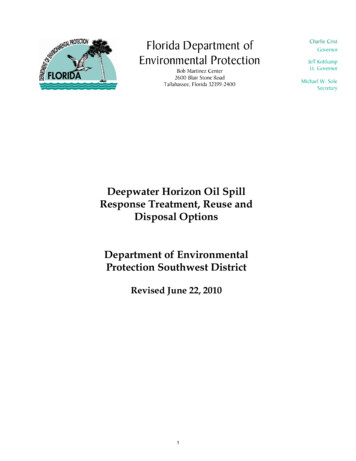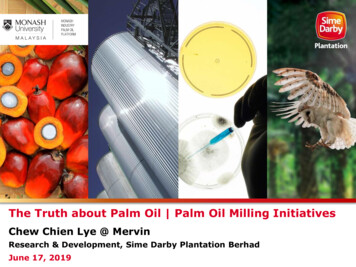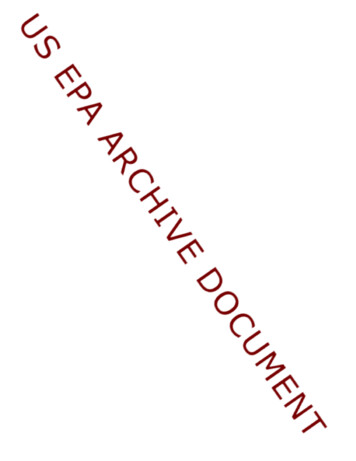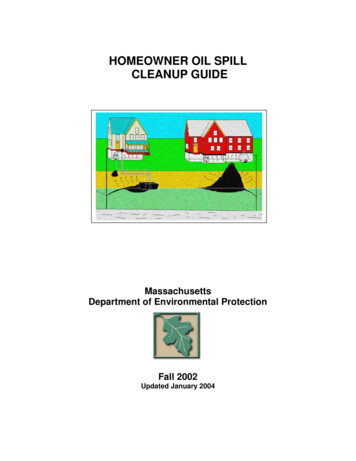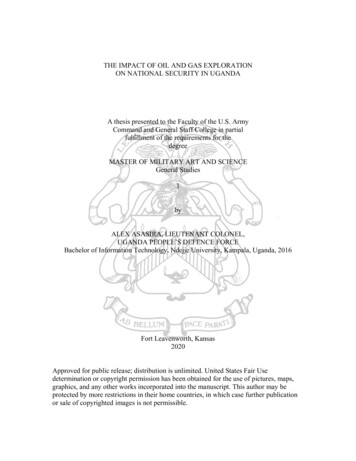
Transcription
THE IMPACT OF OIL AND GAS EXPLORATIONON NATIONAL SECURITY IN UGANDAA thesis presented to the Faculty of the U.S. ArmyCommand and General Staff College in partialfulfillment of the requirements for thedegreeMASTER OF MILITARY ART AND SCIENCEGeneral Studies1byALEX ASASIRA, LIEUTENANT COLONEL,UGANDA PEOPLE’S DEFENCE FORCEBachelor of Information Technology, Ndejje University, Kampala, Uganda, 2016Fort Leavenworth, Kansas2020Approved for public release; distribution is unlimited. United States Fair Usedetermination or copyright permission has been obtained for the use of pictures, maps,graphics, and any other works incorporated into the manuscript. This author may beprotected by more restrictions in their home countries, in which case further publicationor sale of copyrighted images is not permissible.
Form ApprovedOMB No. 0704-0188REPORT DOCUMENTATION PAGEPublic reporting burden for this collection of information is estimated to average 1 hour per response, including the time for reviewing instructions, searching existing datasources, gathering and maintaining the data needed, and completing and reviewing this collection of information. Send comments regarding this burden estimate or any otheraspect of this collection of information, including suggestions for reducing this burden to Department of Defense, Washington Headquarters Services, Directorate forInformation Operations and Reports (0704-0188), 1215 Jefferson Davis Highway, Suite 1204, Arlington, VA 22202-4302. Respondents should be aware that notwithstandingany other provision of law, no person shall be subject to any penalty for failing to comply with a collection of information if it does not display a currently valid OMB controlnumber. PLEASE DO NOT RETURN YOUR FORM TO THE ABOVE ADDRESS.1. REPORT DATE (DD-MM-YYYY)2. REPORT TYPE12-06-20203. DATES COVERED (From - To)Master’s Thesis4. TITLE AND SUBTITLEAUG 2019 – JUN 20205a. CONTRACT NUMBERThe Impact of Oil and Gas Exploration on National Security inUganda5b. GRANT NUMBER5c. PROGRAM ELEMENT NUMBER6. AUTHOR(S)5d. PROJECT NUMBERLTC Alex Asasira5e. TASK NUMBER5f. WORK UNIT NUMBER7. PERFORMING ORGANIZATION NAME(S) AND ADDRESS(ES)8. PERFORMING ORG REPORTNUMBER9. SPONSORING / MONITORING AGENCY NAME(S) AND ADDRESS(ES)10. SPONSOR/MONITOR’SACRONYM(S)U.S. Army Command and General Staff CollegeATTN: ATZL-SWD-GDFort Leavenworth, KS 66027-230111. SPONSOR/MONITOR’S REPORTNUMBER(S)12. DISTRIBUTION / AVAILABILITY STATEMENTApproved for Public Release; Distribution is Unlimited13. SUPPLEMENTARY NOTESThe thesis examined the impacts of the discovery and exploration of oil and gas in Uganda.Significant oil and gas reserves were discovered in uganda in 2006. Although the discovery ofoil and gas is seen as a major development, due to creation of jobs and boosting the economy,no single country in Africa can boast of any success after the discovery and exploration of theresource. The researcher studied Algeria, Nigeria and Sudan in order to posture Uganda, aprospective country in the oil and gas industry to avoid the resources curse. The variables usedwere militarization, land conflicts and economic security. It was found that oil and gas havenegative impacts on security, economy, and land management of the countries studied. It,however, concludes that Uganda still has a chance to escape the resource curse only if, it avoidsmilitilization, and creates a joint task force, use oil and gas revenues for professionlization ofthe army and modernization of agriculture.15. SUBJECT TERMSGas and oil exploration in Africa, Uganda, militarization, land conflicts and economic security16. SECURITY CLASSIFICATION OF:a. REPORT(U)b. ABSTRACT(U)c. THIS PAGE(U)17. LIMITATIONOF ABSTRACT(U)18. NUMBEROF PAGES9319a. NAME OF RESPONSIBLE PERSON19b. PHONE NUMBER (include area code)Standard Form 298 (Rev. 8-98)Prescribed by ANSI Std. Z39.18ii
MASTER OF MILITARY ART AND SCIENCETHESIS APPROVAL PAGEName of Candidate: Lieutenant Colonel Alex AsasiraThesis Title: The Impact of Oil and Gas Exploration on National Security in UgandaApproved by:, Thesis Committee ChairGerald J. Leonard, M.S., MemberWilliam J. Davis Jr., Ph.D., MemberStephen S. Harvey, MBAAccepted this 12th day of June 2020 by:, Acting Director, Office of Degree ProgramsPrisco R. Hernandez, Ph.D.The opinions and conclusions expressed herein are those of the student author and do notnecessarily represent the views of the U.S. Army Command and General Staff College orany other governmental agency. (References to this study should include the foregoingstatement.)iii
ABSTRACTTHE IMPACT OF OIL AND GAS EXPLORATION ON NATIONAL SECURITY INUGANDA, by Lieutenant Colonel Alex Asasira, 93 pages.The thesis examined the impacts of the discovery and exploration of oil and gas inUganda. Significant oil and gas reserves were discovered in Uganda in 2006. Althoughthe discovery of oil and gas is seen as a major development, due to creation of jobs andboosting the economy, no single country in Africa can boast of any success after thediscovery and exploration of the resource. The researcher studied Algeria, Nigeria, andSudan to posture Uganda, a prospective country in the oil and gas industry to avoid theresources curse. The variables used were militarization, land conflicts and economicsecurity.it was found that oil and gas have negative impacts on security, economy, andland management of the countries studied. It, however, concludes that Uganda still has achance to escape the resource curse only if, it avoids militarization, and create a joint taskforce, use oil and gas revenues for professionalization of the army and modernization ofagriculture.iv
ACKNOWLEDGMENTSI specifically acknowledge the inspiration that I received from my wife Lilian andour children, Tracy, Maurice, and Michelle, for giving me the zeal to keep going. Wewere geographically disconnected but remained spiritually and technologicallyconnected. I also thank my thesis committee members for their commitment anddedicated service towards this thesis. I cannot find enough words of appreciation for thelevel of professionalism and commitment exercised by Mr. Gerald J. Leonard,Dr. William J. Davis Jr., and Mr. Stephen S. Harvey to assist me to write this thesis.I especially want to extend my gratitude to my SGA, Mr. Pete G. Minalga, studentambassador CPT Brendan Nintzel, all the instructors and students of SG 16C, my readers,who include, but are not limited to Dr. Pamela Turner PhD, Mary Nol, Ms. BonnieJoranko, and all my three sponsors. My sincere gratitude goes to members of theGraduate Degree Department, program, Dr. Robert Bauman, Dr. Prisco Hernandez, andMrs. Ann Chapman, who never tired of my endless consultations. Finally, to all theimportant people who came along my way because of the Army leadership of my countrywho selected me for this senior leadership development course at the Command andGeneral Staff College, and the almighty God who led me to them. I thank God for allthose whom I mentioned and those I did not, for their physical, psychological, and moralsupport, and for working through me to support this thesis. Without your support, thesituation would have been completely different. Most of all, I thank the almighty God forgiving me the strength and knowledge to write this MMAS thesis.v
TABLE OF CONTENTSPAGEMASTER OF MILITARY ART AND SCIENCE THESIS APPROVAL PAGE . iiiABSTRACT. ivACKNOWLEDGMENTS .vTABLE OF CONTENTS. viACRONYMS . viiiILLUSTRATIONS . ixTABLES .xCHAPTER 1 INTRODUCTION .1Background . 1Definition of Terms . 7Problem Statement . 8Proposed Research Question . 9Secondary Questions. 10Limitations . 10Delimitations . 10Significance of the Study . 11Scope . 11Summary and Conclusion . 13CHAPTER 2 LITERATURE REVIEW .15Introduction . 15National Security . 18Oil and Gas Exploration on Economic Security . 20Oil and Gas Exploration on Security . 24Oil and Gas Exploration and Military Involvement . 30Summary and Conclusion . 33CHAPTER 3 RESEARCH METHODOLOGY .36Introduction . 36Research Design . 36Data Collection and Sources . 39Data Analysis and Presentation . 39vi
Reliability and Validity of Data . 42Summary and Conclusion . 43CHAPTER 4 ANALYSIS.44Introduction . 44Uganda . 45Oil and Gas Exploration on National Security and Military Involvement . 47The Effect of Oil and Gas Exploration on the Economic Security of Uganda . 51Oil and Gas Exploration on Land Issues in Uganda . 59Evaluation Criteria Summary . 62Summary and Conclusion . 65CHAPTER 5 CONCLUSIONS AND RECOMMENDATIONS .66Interpretation of the Findings . 66Recommendations . 70Summary and Conclusions . 73REFERENCE LIST .75vii
ACRONYMSACODEAdvocates Coalition for Development and EnvironmentCIACentral Intelligence AgencyCNOOCChina National Off Shore Oil Corporation LtdCPIConsumer Price IndexCREDCivil Response on Environment and DevelopmentDRCDemocratic Republic of CongoFEEDFront-End Engineering DesignGDPGross Domestic ProductGLRGreat Lakes RegionLDCLeast Developed CountryMINMiddle-Income NationNPCNational Petroleum CouncilWGIWorldwide Governance IndicatorsUPDFUganda People’s Defense ForcesUPFUganda Police Forceviii
ILLUSTRATIONSPageFigure 1. The Albertine Oil Region .6Figure 2. Map of Uganda Showing Lake Albert Where Oil Was Discovered .7Figure 3. Location of Uganda in relation to the neighbors .12Figure 4. Comprehensive Security Framework .19Figure 5. Oil Rich Regions of the Sudan .29Figure 6. Iterative Qualitative Research Process .38Figure 7. Uganda’s Economy by Sector .52Figure 8. Map of Uganda Showing Shared Resources .53Figure 9. East African Proposed Oil and Gas Pipeline via Tanzania (modified byauthor) .54ix
TABLESPageTable 1. Factors Influencing the Risk of Instability .33Table 2. Risk Levels in the Studied Countries .41Table 3. Impact on National Security and Military Involvement .51Table 4. Impact on Economic Security .58Table 5. Risk Levels in the Studied Countries .62x
CHAPTER 1INTRODUCTIONBackgroundThe world over, the discovery and exploration of oil and gas is a major industrialdevelopment and is regarded as a blessing. The sector is not only a major source of jobsbut also increased revenues in many oil producing economies. Crude oil is also referredto as the black gold because of its potential to change the fortunes of countries that areendowed with the resource.However, the former Venezuelan Minister and Oil and Petroleum ExportingCountries (OPEC) cofounder Perez Alonso described the resource as the “Devil’sexcrement” as early as the 1970s (Useem 2003). It was an odd statement at a time whenoil was bringing Venezuela unprecedented wealth—the government’s 1973 revenueswere larger than all previous years combined, raising hopes that black gold wouldcatapult Venezuela straight into First World status.Oil and gas exploration can be a source of good or the cause of untold sufferingdepending on its management and use. Revenues from the resources have potentiallytransformed countries in the world but have also had negative security implications onothers (Cassidy 2019, 2745). Countries like the United States of America, UnitedKingdom, Norway, Canada, United Arab Emirates, Russia, and Saudi Arabia madesubstantial gains from the exploration of oil and gas resources. The aforementionedcountries have strong institutions and their oil and gas revenues benefitted their citizenry(Benghida 2017, 903). Norway, for example, before the discovery of oil and gas was oneof the poorest countries in Scandinavia. Today, it boasts a gross domestic product (GDP)1
per capita of 72,100 USD, ranking it 11th in the world. Although Norway is a welldiversified economy, it is still heavily dependent on petroleum industry, accounting forthe largest portion of its export and contributing 20 percent of its total revenue. None ofits population are below their poverty level. In anticipation of eventual declines in oil andgas production, Norway saved state revenue from petroleum sector activities in theworld’s largest sovereign fund, valued at over 1 trillion at the end of 2017 (CentralIntelligence Agency 2015).Kuwait, on the other hand, a geographically small but wealthy country, althoughnot well diversified, has a relatively open economy. It has crude oil reserves of about 102billion barrels, which is more than 6 percent of the world reserves according to CIA factfiles 2017. Petroleum accounts for more than a half of its GDP, 92 percent of exportrevenue, and 90 percent of government income. With the world oil prices declining,Kuwait recorded a budget deficit in 2015 for the first time in more than a decade. In2016, the deficit grew to 16.5 percent prompting the government to make budget cuts forsubsidies. Kuwait failed to diversify its economy due to poor business climate and a largepublic sector that employed more than 70 percent of the population. An acrimoniousrelationship between the Kuwait national assembly and the executive branch stymiedmost economic reforms (Central Intelligence Agency 2020).Africa cannot boast of any successes in the exploration of oil and gas resources.Most oil-rich African countries are plagued with problems ranging from economicthrough social and security challenges. Examples of oil and gas rich African countriesinclude, but are not limited to Nigeria, Chad, Sudan, Algeria, Equatorial Guinea, Gabon,Angola, Egypt, Tunisia, Cameroon, and South Africa. The only real success in extractive2
industry is Botswana with a remarkable accomplishment in its diamond exploration.Although diamonds are not the focus of this paper, it also falls under extractive industry.“Ten years from now, twenty years from now, oil will bring us to ruin in fact it isa devil’s excrement.” This was a comment made by Pablo in 1975, a Venezuelanpolitician and one of the powerful founders of OPEC. This expression appears to be truefor African oil and gas rich countries (Useem 2003, 1). A study of oil and gas richAfrican countries reveals in most cases a myriad of problems which plague the oil andgas industry with varying degrees of trouble. These range from discontent and civil strifeover the management of the resource and its revenue to different levels of insurgency.Arguably, the discovery of oil and gas in commercial quantities for some Africancountries has aggravated the social economic and political woes for those countriesinstead of being a catalyst for growth and prosperity. Oil is said to account for over 90percent of the world’s trade in minerals and is the biggest source of problems for thelargest number of countries endowed with the resource (Ross 2012).The Hardman Petroleum Pty Ltd discovered significant oil and gas reserves forcommercial exploitation in Uganda in 2006 (Kuteesa 2015, 1). After passing thecommercial threshold of oil discoveries in 2009, the industry shifted from small-sizedwildcat exploration companies and oil independents to include large-sized oilcorporations intent on development and production. These large-sized oil corporationsinclude: Tullow Oil, a British oil independent with a strong record of accomplishment forfrontier success; Total SA, a French oil corporation with nearly unparalleled technicalexpertise and operational experience; and China National Off Shore Oil Corporation Ltd(CNOOC), a Chinese state oil giant with sizable capital (Patey 2015, 9). By the end of3
2013, Uganda’s proven oil and gas reserves were estimated by the Ugandan PetroleumExploration and Production Department to be 6.5 billion barrels. These discoveries areexpected to yield at least 2 billion USD per year for thirty years once oil productioncommences (Kuteesa 2015, 1).Bomuhangi and Doss (2011, 23) indicated that oil exploration activities, such asthe digging of seismic wells and drilling, have already led to changes in ownership ofland, conflict, and displacement as well as an influx of migrants vying for opportunitiesin the Albertine Graben. Major businesses in these areas are developing beaches,restaurants, hotel accommodations, supermarkets, and oil and gas stations. Civilresponses to environmental and development found there has been a problem ofUgandans subordinating fellow Ugandans for personal gain (Civic Response onEnvironment and Development 2015, 34). Land in the Albertine Graben has becomeincreasingly valuable for many wealthy Ugandans eager to benefit from the oil wealth. Itis being carved out for Uganda’s wealthy elites with little or no regard for the currentinhabitants. The study by Civic Response on Environment and Development (CRED)emphasizes that the action of these wealthy elites is symptomatic of an overall pattern ofoil-influenced land grabs occurring throughout the Albertine region. It points out thatwealthy and influential elites attempt to gain ownership of customary land to make aprofit off selling the same land to investors and multinational corporations, expressinginterest in land for high-value oil-based investment projects like the oil refinery and oilwaste treatment plants (Civic Response on Environment and Development 2015, 4).A total of nine production licenses have been issued so far in Uganda. The firstone was issued to CNOOC in 2013. Tullow Uganda Operations Pty Limited and Total4
SA were issued with five and three licenses respectively in August 2016. The issuance ofthese production licenses was a huge milestone and is expected to fast-track the foreigninvestment decision of the three joint venture companies which is expected by the end of2017. In February 2017, Technip, Fluor and Chicago Bridge and Iron Company wereawarded a contract for the first phase of the Front-End Engineering Design (the FEED)on two of the exploration areas.The discovery of oil and gas in Uganda presents a unique challenge because it isin a rift valley and Lake Albert shared between Uganda and Democratic Republic ofCongo (DRC). Moreover, the two countries have a history of fighting over the relativelyinsignificant Rukwanzi Island located in Lake Albert. The matter has never been resolvedto date and remains a threat to the national security of Uganda. Thus, this research willattempt to design tentative solutions to potential disputes involving oil resource inUganda.5
Figure 1. The Albertine Oil RegionSource: Daily Monitor. 2020. “Map of Uganda Showing Mineral Occurrences.” Accessed17 October 2019. hRes/392588//maxw/600/-/p4gdtq/-/home003pix.jpg. A cross section of the part of the western RiftValley (Albertine region).6
Figure 2. Map of Uganda Showing Lake Albert Where Oil Was DiscoveredSource: The Herald, “Lessons from Ugandan oil experience,” 21 July 2017, accessed 20October 2019, experience/.Definition of TermsSecurity is defined as ‘the pursuit of freedom from threats and ability of states tomaintain their independent identity and their functional integrity against changes whichare seen as hostile. It is the pursuit of freedom from threats (Buzan, Wæver, and de Wilde1998, 21).National security is the ability to preserve the nation’s physical integrity andterritory; to maintain its economic relations with the rest of the world on reasonableterms; to preserve its nature, institution, and governance from disruption from outside;and to control its borders (Brown 2002, 2).7
Economic Security. The condition of having stable income, employment, orentrepreneurial support to maintain what one considers to be an acceptable standard ofliving (Nanto 2011, 16).Ecological Security also known as environmental security. The U.S Departmentof State (2001) categorized ecological security as an element of regional or nationalsecurity which encompasses the mitigation and prevention of energy threats, includingthreats to sources and supply lines, and environmental risks and related stresses thatdirectly contribute to political and economic instability or conflict in foreign countries orregions of importance to the United States.Local environmental or resource pressures. These include resource scarcitiesleading to local conflict, such as disputes over water scarcity, failure of agriculture and arise in population and dwindling availability of farmland, may also have contributed tonational insecurity (Humphreys, Sachs, and Stiglitz 2007, 1).Problem StatementThe discovery of petroleum in Uganda by government geologist EJ Waylanddates back to 1925 although commercial exploration by Hardman Petroleum Pty Ltd,now known as Tullow, started in 2006. Global Rights Alert (2016). Ugandans receivedthe news of the discovery of oil and gas with optimism and pessimism; optimism becauseit is an opportunity to move Uganda into the much-anticipated middle income status, andpessimism because the population of third world oil and gas producing countries arefaced with violent conflicts and abject poverty (Kuteesa 2015, 3). Either way, thediscovery and exploration of oil and gas will have a direct impact on the national andregional security. Exploration of oil and gas in Uganda could be delayed because of8
disputes between exploration corporations and the government of Uganda (Patey 2015,21). There is a great deal of out-cry by local citizens within oil and gas rich area causedby wealthy land grabbing citizens who are taking advantage of the situation. As a result,many people have become homeless or forced into the camps which has led them tomisinterpret oil and gas as a curse instead of the long-awaited blessing (Magona 2017, 6).While Uganda awaits anxiously for its first drop of oil in 2020, it is under scrutiny overhow it will handle a natural resource that has been considered both a blessing and a curse.Furthermore, neighboring countries within the upper western Rift Valley have notwelcomed the news of Uganda’s oil discovery. A subsequent proposal, with many claimsto start drilling in good faith, it puts the future of Ugandan oil and gas industry at stake(Magona 2017, 5). There are many ongoing debates among Ugandan politicians and civilinstitution to ascertain whether the discovery of oil and gas in Uganda will be of anybenefit to locals and to the national economy, however, opposition politicians haveargued that it is going to be used by the current government of Uganda to over stay inpower and get much money to bribe and coerce citizens by state machineries (Magona2017, 6). This thesis will bridge the literature gap in research by thoroughly investigatingthe impact of oil and gas exploration on national security in Uganda.Primary Research QuestionThe overarching research question that this study is seeking to answer is: Whatare the impacts of oil and gas exploration on national security in Uganda? In trying toanswer this question, the following secondary questions are set.9
Secondary QuestionsWhat is the role of the Ugandan security forces in relation to oil and gasexploration?How will Ugandan government respond to the emerging national securitychallenges associated with exploration?LimitationsThe main limitation to this study is it must be combined with the Command andGeneral Staff College Intermediate Level Education course. The Intermediate LevelEducation curriculum is an intensive one. This, along with the fact that the research mustbe completed before the course ends might affect the amount of research that can be doneand could possibly take away from the worth of the work done. It eliminates thefeasibility of collecting data from the field for the research and hence, limits the sourcesof information extensively to secondary data. Some reference materials requirecopyrights permission while others may not be accessible at this time. However, theavailable resources are sufficient to provide data for this research.DelimitationsThe research is limited to the impacts of oil and gas exploration on nationalsecurity in Uganda while studying examples of Algeria, Nigeria, and Sudan. The thesiswill, however, make references to the rest of the world including USA, UK, Norway,Middle East, and Latin America. Similarly, this research will use terms such as oil, gas,and petroleum industry interchangeably.10
Significance of the StudyThe study will help military and other scholars who operate in oil-rich countriesto understand the dynamics of oil and gas exploration on national security. It will alsohelp Uganda as well as other oil producing countries to manage the resources well whilepaying attention to national security to turn the resource into a blessing rather than acurse. More so, it will attempt to fill the literature gaps, as most scholars writing about oiland gas discovery in Uganda concentrated on its management, environmental protection,and exploration companies, giving little or no attention to its impact on national security.Beyond filling the scholarly gaps, the research will help the Ugandan government tomake informed decisions on the impacts of oil and gas exploration to national security.The thesis will articulate solutions on exploration of oil and gas while maintainingnational security which is a major pillar to achieving Uganda vision 2040. The vision
Stephen S. Harvey, MBA . Accepted this 12th day of June 2020 by: _, Acting Director, Office of Degree Programs . Prisco R. Hernandez, Ph.D. The opinions and conclusions expressed herein are those of the student author and do not necessarily represent the views of the U.S. Army Command and General Staff College or





